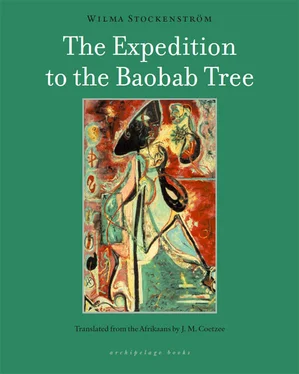Long ago abandoned trying to hold a conversation with them. My requests were fulfilled in silence. No answers. No questions. It was like trying to get through to zombies. More than in the city where I necessarily had to work with this type, it struck me here in untouched nature how inhumanly they were behaving. Whether unwilling or to appearances obliging, their actions were those of fellows of the tikoloshe-spirit, it occurred to me. Their eyes were peculiarly empty, their motions automatic as if they were obeying built-in commands.
We have people bewitched among us, I whispered to the stranger.
Didn’t you notice it before?
I stared at him in surprise. We were relaxing in the heat of noon under a splendid cucumber tree on the bank of a full river. The eldest son had gone for a walk, as usual without mentioning it to us, without saying where he was going; he would probably reveal nothing when he came back. And we two, we felt too happy in each other’s presence to care about his morbid reserve, we two were a self-sufficiency and, jealously eager for each other’s attention, let the sourpuss go his way.
We had just finished eating what the slaves had prepared for us. Had it not been for the handfuls of flying ants that one of them had collected the previous night and turned into a tolerable sauce, we would have had to choke down the thick millet porridge just like that. As we had been doing for several days. For with the disappearance (or was it the theft?) of the cattle and the redistribution of the packs, some of the goods had of necessity to be left behind, and thus, by mistake, we had to assume, the rice, the dried shrimps, the mango chutney, the dried fig cakes, the coconuts, the dates and much else was left behind. There were no accusations of carelessness thrown back and forth, but to discord smoldered. One leader formed the vanguard, the other leader and I the rearguard, and we were separated by mistrust and by a train of slaves.
Sugarbirds clung to the bunches of purple-red flowers that displayed themselves above our heads. There was a languid cooing of doves. A virtual stasis reigned. Water shining among plumed reeds. A caressing breeze. I am listening, I said. Tell.
At night I call all my familiar spirits, whispered the stranger, pretending to be mysterious. Have you not yet heard the hyena snuffling? Just as well you sleep so deeply. Have you not yet heard the faraway bark of the baboon?
Have you not yet seen the aardvark’s hump stand out against the moonlight and the long snout with which he sniffs out the corpses? Poor inhabitants of the villages along our route, they don’t know what hits them. They have no knowledge of wizards who make an appearance now here now there and make their familiars violate their graves. Have you not yet seen the eyes shining in the night, eyes red as fire, half-eyes, squint eyes? Have you not yet heard the growling and the scrabbling and the shuffling, and the cracking of bones? I send my familiars into the kraals to the graves of the chieftains. The cattle are too terrified to low. They stand aside. The next day the cows drop calves with two heads and the golden-red acres of millet through which the familiars galloped with their enchanted riders lie flattened and cannot be harvested, and the great famine comes to all the regions through which we travel. The storage baskets are emptied. The livestock die. People look at one another with eyes red as fire, with half-eyes, with squint eyes, and fall upon the weak and eat them up. They cut off their lips and fingertips, they let them bleed to death in pots of water, cook them and eat them up, the tastiest bits for the strongest, the offal and the gravy for what children remain.
The stranger went and lay flat on his back and stared up through the latticework of branches and dark green insets of foliage to the tatters of blue sky.
Pretty stories, he said. He supported his head on his hands. I have tried to live, he said, without religion and other such superstitions, without escapism of any kind, and now I find myself in the greatest illusion of my life. Now I seek consolation in shortsightedness and look no further than the night of every day.
There followed a mumbled rumination that I could not follow properly. I thought I heard him ask me for forgiveness. He stopped the mumbling. He sat up and looked at me narrowly.
I shall have to live the story out to its end, he decided. All stories end. For a moment he was still, his attention drawn by a swarm of starlings flying round and round the cucumber tree.
All I know is that I wanted to, he said sharply, as if answering an unuttered question of mine. I wanted to. Then he added, with the slightest trace of a smile in the furrows at the corners of his mouth and in the narrowing of his eyes: I think one can be ridiculous with dignity. Or try to.
Something broke through the underbrush on our left. Flapping, waving and shouting with fear the eldest son came racing towards us, stumbled like a clown and slipped over the tussocks of grass. The hem of his clothes caught on a num-num bush and held him back; jerking and pulling desperately, beating the bush flat with his cane, he tried angrily to rid himself of the thorns’ grip, but only got further entangled, and eventually had to tear his clothes free. All the while he hoarsely commanded us and the slaves to fall flat, to hide, to crouch, to creep away, to make ourselves scarce.
Instead of making ourselves scarce we all stood up straight and gazed dumbstruck at the spectacle. With a muffled curse he freed himself from the num-num thorns and stamped over to us and explained that there was an army on the way, on the river.
Fall flat! Fall flat! he exhorted us panting. He must have run quite a distance in the hot sun.
He himself fell to his knees behind the dense reeds and hushed as if in prayer. I considered whether to follow his example. The stranger and I exchanged amused looks, though no longer exactly beaming with self-confidence and boldness, and when one of the slaves silently gestured that he saw something coming, we did indeed fall flat with our noses to the ground, each on the spot where he had stood.
I managed to turn my head carefully to one side and peer at the river, but detected nothing as yet. The plumes arched so calmly. The waterfowl had not let themselves be alarmed. I could see brown ducks drifting in the shallow water and also a giant heron’s motionless head and neck sticking out above the reeds, and as I lifted my face slightly higher I saw the tense blue hovering tremor of a kingfisher at diving distance above the water and could also see the far bank walled off from the veld by a rampart of fully grown wild figs.
My ears helped me. I heard the thump of oars and concentrated on listening very carefully. I thought I could recognize human voices. Tatters of speech came to us where we lay quiet as wild animals, waiting for danger to pass. Later I saw through jagged cracks in the reeds several hollowed-out tree trunks sailing past in pairs in a kind of formation from left to right, each with a team of rowers rowing upstream with great effort. The oars came up dripping and sank rhythmically. Their progress was very leisurely. Probably the speed of the current was badly against them here. In about the middle of the formation one hollowed-out tree trunk larger than the rest glided past alone, with, it seemed to me, a larger crew wearing tufts of animal tails around their upper arms, and in the stern there seemed to be a kind of throne on which a man sat with a silvery apeskin cloak around his shoulders, and next to him stood someone holding an object like an umbrella plaited from palm leaves or grass or both over him to protect him from the sun.
It was not fragments of speech I was hearing, I realized. It was the groaning of the rowers as they labored.
Читать дальше












